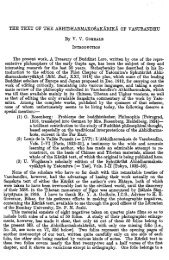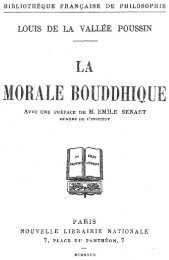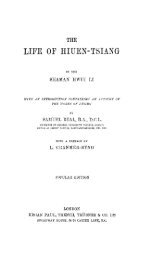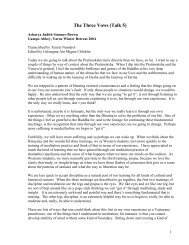La Vallée Poussin Musīla and Nārada. The Path - Gampo Abbey
La Vallée Poussin Musīla and Nārada. The Path - Gampo Abbey
La Vallée Poussin Musīla and Nārada. The Path - Gampo Abbey
You also want an ePaper? Increase the reach of your titles
YUMPU automatically turns print PDFs into web optimized ePapers that Google loves.
Musıla <strong>and</strong> N›rada. <strong>The</strong> <strong>Path</strong> of Nirv›˚a: by Louis de <strong>La</strong> <strong>Vallée</strong> <strong>Poussin</strong><br />
path outside of the seven bases or resources. <strong>The</strong>refore one is able to engender true cognition by<br />
relying on the concentration of the desire realm. 35<br />
b. Question. – This person [= the perfected being in the Susıma] attains the path of perfected<br />
being (arhat) by relying on the preliminary stage (s›mantakabhÒmi) of the first meditation, not by<br />
relying on the concentration of the desire realm.<br />
Answer. – No, because by saying: ‘outside of the seven bases or resources’, one excludes the<br />
first meditation with its preliminary stage.<br />
Furthermore, there is no reason to rely on the preliminary stage <strong>and</strong> not on the concentration of<br />
the desire realm. If these practitioners are able to enter into the preliminary stage, why would<br />
they not enter into the first meditation? <strong>The</strong>re is no reason for that.<br />
Furthermore, the SusımasÒtra says: “First comes the ‘cognition of the stability of the factors’<br />
(dharmasthitijñ›na), afterwards the ‘cognition of Nibb›na’ (nirv›˚e jñ›na)”, 36 which means that it<br />
is not necessary first to attain the concentration of meditation in order to then reach the<br />
‘destruction of the fluxes’ (›sravak˝aya): only the prior ‘cognition of the stability of the factors’ is<br />
needed to arrive at the ‘destruction of the fluxes’. <strong>The</strong>refore we know that the concentration of<br />
meditation is put aside [as unnecessary]. <strong>The</strong> SusımasÒtra was spoken in order to put it <br />
aside… No sÒtra names the ‘preliminary stage’. <strong>The</strong>refore it is your own imagination…<br />
c. Question. – We have [previously] given the comparison of one wedge driving out another.<br />
By means of the path of one stage the fetters of another stage are cut off. Just as a small wedge<br />
drives out a big wedge, just so the path of the form realm (rÒpadh›tu) cuts off the desire realm<br />
(k›madh›tu). <strong>The</strong> practitioners, when they have first cut off the desire realm <strong>and</strong> the bad factors<br />
(dharma), are then able to enter into the first meditation: whence the necessity of a preliminary<br />
stage by means of which the desire realm is cut off.<br />
Furthermore, it is said: “Because of the form realm, one leaves the desire realm”: if there were<br />
no preliminary stage, how [would one leave the desire realm] because of the form realm?<br />
Furthermore, the sÒtra says that the practitioners, by attaining pure complacency are able to<br />
ab<strong>and</strong>on impure complacency: as N<strong>and</strong>a, out of love for the goddesses, ab<strong>and</strong>oned his natural<br />
desire.<br />
Furthermore, if one does not taste the calm of the first meditation, how could one the five sense<br />
objects (k›ma) as being ‘coarse-perverted’?<br />
35 <strong>The</strong> Sarv›stiv›da is far from denying that there is a ‘concentration’ of the desire realm. On the contrary, it<br />
teaches that concentration (sam›dhi), i.e., the one-pointedness on the object of the mind, which makes the<br />
mind rest on an object in an uninterrupted stream, is necessary in every mind-state (KoŸa, ii, 156). But this<br />
ordinary concentration (sam›dhi) is not effective for discrimination.<br />
36 Below, F 207.<br />
18






